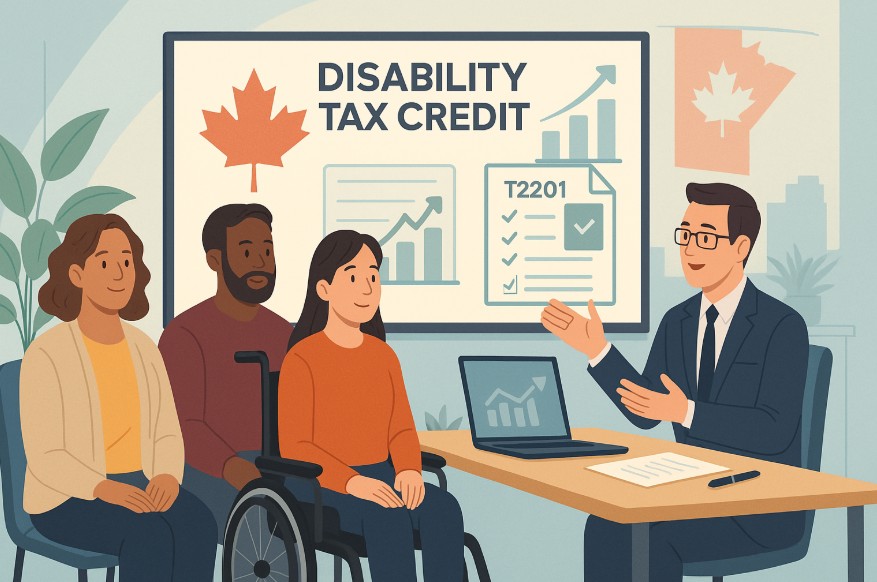Are you living in Manitoba and facing the financial challenges of living with a disability? You may qualify for a tax benefit that could ease your burden the Disability Tax Credit (DTC). This federal non-refundable tax credit is designed to help reduce the amount of income tax you owe, and if you’re eligible, it could mean thousands of dollars in savings or refunds.
The DTC can be a crucial financial support tool, yet many Manitobans don’t know they qualify or how to apply. This guide will walk you through everything you need to know about the Disability Tax Credit in Manitoba, from who qualifies and how to apply, to the benefits you may receive and where to get help.
Whether you’re applying for yourself or a loved one, this blog provides straightforward, trustworthy information to help you make informed decisions and access your full entitlements.
What Is the Disability Tax Credit in Manitoba?

The Disability Tax Credit (DTC) in Manitoba is a federal non-refundable tax credit that reduces the income tax individuals with disabilities, or their caregivers, might owe. It is meant to help offset the extra expenses associated with living with a physical or mental impairment.
Manitoba residents approved for the DTC can receive both federal and provincial tax relief. The benefit doesn’t come as a cash payment but rather as a reduction in the amount of tax owed. If your income is too low to use the full credit, some or all of it can be transferred to a supporting family member.
Key benefits include:
- Reduction in taxes payable
- Access to other federal benefits (RDSP, Canada Workers Benefit supplement)
- Retroactive tax refunds (up to 10 years)
It’s important to note that approval is handled by the Canada Revenue Agency (CRA), and eligibility requires certification from a qualified medical practitioner. While it’s a national program, residents of Manitoba also receive a provincial supplement, increasing the potential financial relief.
Who Qualifies for the Disability Tax Credit in Manitoba?
To qualify for the Disability Tax Credit in Manitoba, you must meet both medical and residency requirements set by the CRA. This credit is intended for people with severe and prolonged physical or mental impairments that impact their ability to carry out everyday activities.
Eligibility criteria include:
- You live in Manitoba and are a Canadian citizen or permanent resident
- Your condition has lasted or is expected to last at least 12 months
- You are markedly restricted in at least one daily living activity such as walking, speaking, hearing, seeing, feeding, dressing, or mental functions
- A licensed medical practitioner certifies your condition on the CRA’s T2201 Disability Tax Credit Certificate
Conditions can include physical impairments like multiple sclerosis or blindness, psychological conditions like severe anxiety or depression, and neurological disorders such as autism or ADHD.
If your income is low and you cannot fully use the credit, a spouse or supporting relative may claim it on your behalf. For children under 18, additional benefits like the Child Disability Benefit may apply, increasing your total support.
How Do You Apply for the Disability Tax Credit?

Applying for the Disability Tax Credit in Manitoba might seem complex, but the steps are straightforward if you follow the CRA-approved process. Here’s how to get started:
Step-by-step DTC Application Process
The application begins by completing Form T2201, which is available online through the CRA. This form must be filled out by both the applicant and a qualified medical practitioner. Make sure all parts of the form are completed accurately to avoid delays or denials.
Downloading and Completing the T2201 Form
You can download the T2201 form from the CRA website or request a physical copy. Part A is filled out by you (or your legal representative), and Part B is completed by a medical professional. Ensure the form includes your Social Insurance Number and full address.
Getting Medical Certification
A doctor, psychologist, audiologist, or other licensed professional must certify your impairment. They will describe how your condition affects your daily life. Be honest and detailed when describing your symptoms to help them write an accurate assessment.
Once completed, submit the form to the CRA by mail or through CRA My Account. You will be notified by mail once a decision is made.
What Documents Do You Need for the Disability Tax Credit?
When applying for the Disability Tax Credit in Manitoba, having the correct documentation ensures your application is processed smoothly and on time. The most critical document is the T2201 Disability Tax Credit Certificate.
Key documents to gather include:
- Completed T2201 form (Parts A and B)
- Valid medical diagnosis from a qualified professional
- Personal identification documents (e.g. SIN, photo ID)
- Proof of Canadian residency (utility bills, lease, etc.)
- Past tax returns (for retroactive claims)
- Any supporting documentation for treatment or life-sustaining therapy
- A signed letter of consent if applying on someone else’s behalf
If your medical practitioner charges a fee to complete the form, you can claim that fee as a medical expense on your income tax return. Be sure to keep receipts.
If you’re applying retroactively, you may need past T2201 forms or medical evidence showing the duration and severity of the impairment. Having clear, complete, and well-documented evidence can significantly improve your chances of approval by the CRA.
How Long Does It Take to Get Approved?

Once your T2201 form is submitted to the CRA, the processing time for your Disability Tax Credit application can vary. Typically, CRA reviews DTC applications in 8 to 12 weeks, though it may take longer if more information is requested.
CRA processing time depends on:
- Whether you applied electronically or by mail (online is faster)
- The completeness and clarity of your application
- The nature and complexity of your disability
- Whether the CRA requires additional documentation or clarification
If you submit your DTC application alongside your tax return, CRA will assess your credit before finalizing your return. If they require more details, you’ll receive a request by mail with a reference number and instructions on how to respond.
After your application is assessed, CRA will send a notice of determination by mail. This letter will outline whether you were approved, the tax years it applies to, and whether you can claim retroactive credits. If approved, your CRA My Account will reflect the credit status, and your tax preparer can begin claiming the amounts.
Can You Get Retroactive Payments for the DTC?
Yes, you can receive retroactive tax credits through the Disability Tax Credit if you were eligible in previous years but didn’t apply or claim the credit. The CRA allows retroactive claims for up to 10 years, depending on when your impairment began and your tax-filing history.
When submitting your application, check the box on the T2201 form asking the CRA to review your past tax returns. If this is selected, they’ll automatically assess your previous returns and determine any refunds you may qualify for.
Key points to consider:
- You can claim back as far as a decade, subject to eligibility
- The amount varies based on your income and provincial tax rates
- If you didn’t check the retroactive option, you can still submit a written request later
- CRA may ask for past medical records to support retroactive claims
Retroactive credits are issued as tax refunds. These funds can make a significant difference, especially if you or your supporting family member has been financially burdened by the impairment over several years. Always provide clear dates and documentation to strengthen your claim.
How Much Can You Save With the DTC?

Understanding the financial impact of the Disability Tax Credit in Manitoba is key to seeing why it’s worth applying. The credit can reduce your federal and provincial income tax by thousands of dollars annually.
For 2024 and 2025:
- Federal Base Amount: $10,138 × 15% = approx. $1,520.70
- Provincial Base Amount (Manitoba): $6,180 × 10.8% = approx. $667.44
- Federal Supplement for Children: $5,914 × 15% = approx. $887.10
- Provincial Supplement for Children: $3,605 × 10.8% = approx. $389.34
Combined, an eligible adult may receive about $2,188.14 in credits per year, and an eligible child under 18 could qualify for up to $3,464.58 annually.
These credits are not direct payments but reduce the taxes you owe. If you owe less than the credit, the unused portion may be transferred to a caregiver or family member. The savings can add up fast, especially when claimed retroactively, potentially resulting in thousands of dollars refunded to your family.
What Happens If Your Application Is Denied?
If your application for the Disability Tax Credit in Manitoba is denied, you still have options. Many applications are rejected due to incomplete information or unclear documentation, not because the applicant is ineligible.
The CRA will send you a letter explaining why your application was denied. Review this explanation carefully to identify any missing details or misunderstandings.
Common reasons for denial include:
- Incomplete T2201 form
- Medical condition not clearly explained
- Duration of impairment less than 12 months
- No evidence of marked restriction in daily activities
Once you’ve identified the issue, you can take the following steps:
- Submit additional medical information to clarify your condition
- Request a review or reconsideration of your case with a detailed letter
- File a formal objection to appeal the CRA’s decision (within 90 days)
Many people succeed on appeal by strengthening their case with better medical descriptions and supporting documentation. It’s often wise to seek help from a tax or disability advocate to guide you through the reconsideration process for better outcomes.
How Does the Disability Tax Credit Help Manitobans?

The Disability Tax Credit offers substantial support to Manitobans facing the daily costs of living with disabilities. Whether you’re applying for yourself or a loved one, this credit helps reduce your financial stress and offers long-term stability.
Impact on Families and Individuals
For individuals, the DTC can lower your tax burden significantly. Families with children who have disabilities may qualify for additional supplements, easing the cost of caregiving, therapies, and special education. These savings can be life-changing, especially for households managing ongoing care and support.
How It Complements Provincial Programs
The DTC is a federal credit, but it works alongside Manitoba-specific programs like the Primary Caregiver Tax Credit and Community Living disABILITY Services.
These combined supports help Manitobans access housing, daily care, therapy, and income assistance. Being eligible for the DTC often opens doors to other provincial benefits without affecting eligibility.
Real-life Benefits and Relief
Beyond tax relief, many families report being able to afford mobility aids, special diets, or therapy sessions thanks to the refund. Some even receive lump sum retroactive credits, providing crucial financial breathing room during difficult periods.
Where Can You Get Help With Your DTC Application?
Navigating the Disability Tax Credit process doesn’t have to be overwhelming. In Manitoba, various resources are available to help guide you through the application and ensure it’s done correctly.
Here are your top support options:
- Canada Revenue Agency (CRA): Visit the CRA website or call 1-800-959-8281 for general guidance, status checks, and form instructions
- CRA My Account: Use it to download forms, upload documents, and check updates
- Medical professionals: They are responsible for completing Part B of the T2201 form and can explain how your impairment qualifies
- Disability Credit Canada: A trusted advocacy group that helps Canadians prepare strong applications, review denials, and file appeals
- Community agencies in Manitoba: Organizations like the Society for Manitobans with Disabilities offer guidance or referrals
If you’re uncertain about any step in the application, consider professional help. Experts understand how to present your case clearly to the CRA and maximize your eligible tax refunds. They can also assist with retroactive claims and responding to CRA inquiries.
Conclusion
The Disability Tax Credit in Manitoba is more than just a tax benefit, it’s a tool for financial relief and improved quality of life for people living with disabilities. By understanding who qualifies, how to apply, and what benefits are available, you take the first step toward gaining long-overdue support.
This credit can reduce your tax burden, unlock access to other programs, and potentially lead to a refund going back 10 years. It’s worth the effort to apply even if you’ve been denied in the past.
If you or a loved one lives with a prolonged mental or physical impairment, you deserve this support. Take action today, gather your documents, speak with your doctor, and start the process. The reward could be a more secure and manageable future for you and your family.
FAQs
How do I know if I’m eligible for the DTC?
You may be eligible if you have a prolonged physical or mental impairment that limits your daily activities. A medical practitioner must certify your condition on the T2201 form.
What should my doctor include in the T2201 form?
They should describe how your condition affects your ability to function in daily life, including details on the severity and duration.
Can I apply for the DTC on behalf of my child or spouse?
Yes, you can apply on behalf of a dependent child or spouse. If approved, the tax credit can also be transferred to you if they can’t use it fully.
What is the difference between federal and provincial DTC?
Federal credits apply across Canada, while provincial amounts like Manitoba’s add extra tax savings specific to your province of residence.
Will the DTC affect my other government benefits?
No, qualifying for the DTC will not negatively impact your eligibility for other federal or provincial programs.
Do I need to reapply for the DTC every year?
Not always. If the CRA approves your credit for multiple years, you do not need to reapply unless your condition changes or approval ends.
Is there professional help available for DTC applications?
Yes, many organizations and tax experts specialize in DTC applications. They can help strengthen your application and increase approval chances.




